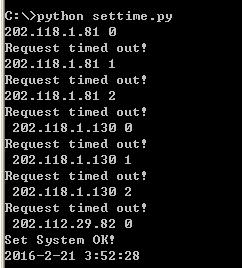python脚本设置超时机制系统时间的方法
本文为大家介绍了python脚本设置系统时间的方法,一共有两种,其一是调用socket直接发送udp包到国家授时中心,其二是调用ntplib包。我在本地电脑ping 国家授时中心地址cn.pool.ntp.org有时出现丢包,然而,二者都没有检查udp是否丢包的机制,方法一在udp丢包后一直处于阻塞状态无法退出,方法二虽然会提示超时,但是不再做其它尝试,比如重新发包,或者向同一个域名的不同IP地址发包。于是,尝试在方法一的代码基础上,增加了超时机制,并且尝试向同一个域名的不同IP地址发包。

具体修改后的完整代码如下:
#-*- coding:utf-8 -*-
import socket
import struct
import time
import win32api
import os
import re
def getTime(TimeServerAddresses):
TIME_1970 = 2208988800L
client = socket.socket(socket.AF_INET, socket.SOCK_DGRAM)
client.settimeout(3)
data = '\x1b' + 47 * '\0'
#TimeServer_ip=socket.gethostbyname('cn.pool.ntp.org')
#TimeServer_ip='202.118.1.130'
Port=123
for address in TimeServerAddresses:
success=False
count=0
while not success and count<3:
print address,count
try:
client.sendto(data, (address, Port))
data, address = client.recvfrom(1024)
success=True
except socket.timeout:
print 'Request timed out!'
count=count+1
if success==True:a
break
data_result = struct.unpack('!12I', data)[10]
data_result -= TIME_1970
return data_result
def setSystemTime(now_time):
tm_year, tm_mon, tm_mday, tm_hour, tm_min, tm_sec, tm_wday, tm_yday, tm_isdst = time.gmtime(now_time)
win32api.SetSystemTime(tm_year, tm_mon, tm_wday, tm_mday, tm_hour, tm_min, tm_sec, 0)
print "Set System OK!"
def getServerIP():
res1=os.popen('nslookup cn.pool.ntp.org')
result1=res1.read()
addresses=result1.split('\n\n')[1].split('\n')[1][12:].split(',')
return addresses
#for address in addresses:
# res=os.popen('ping -n 2 '+address)
# result=res.read()
# received_num=int(re.findall('Received = [0-9]',result)[0].split('=')[1])
# if received_num > 1:
# break
#TimeServer=address
if __name__ == '__main__':
addresses=getServerIP()
now_time=getTime(addresses)
setSystemTime(now_time)
print "%d-%d-%d %d:%d:%d" % time.localtime(now_time)[:6]
以上就是本文的全部内容,希望对大家的学习有所帮助。

Hot AI Tools

Undresser.AI Undress
AI-powered app for creating realistic nude photos

AI Clothes Remover
Online AI tool for removing clothes from photos.

Undress AI Tool
Undress images for free

Clothoff.io
AI clothes remover

AI Hentai Generator
Generate AI Hentai for free.

Hot Article

Hot Tools

Notepad++7.3.1
Easy-to-use and free code editor

SublimeText3 Chinese version
Chinese version, very easy to use

Zend Studio 13.0.1
Powerful PHP integrated development environment

Dreamweaver CS6
Visual web development tools

SublimeText3 Mac version
God-level code editing software (SublimeText3)

Hot Topics
 Is the conversion speed fast when converting XML to PDF on mobile phone?
Apr 02, 2025 pm 10:09 PM
Is the conversion speed fast when converting XML to PDF on mobile phone?
Apr 02, 2025 pm 10:09 PM
The speed of mobile XML to PDF depends on the following factors: the complexity of XML structure. Mobile hardware configuration conversion method (library, algorithm) code quality optimization methods (select efficient libraries, optimize algorithms, cache data, and utilize multi-threading). Overall, there is no absolute answer and it needs to be optimized according to the specific situation.
 Is there any mobile app that can convert XML into PDF?
Apr 02, 2025 pm 08:54 PM
Is there any mobile app that can convert XML into PDF?
Apr 02, 2025 pm 08:54 PM
An application that converts XML directly to PDF cannot be found because they are two fundamentally different formats. XML is used to store data, while PDF is used to display documents. To complete the transformation, you can use programming languages and libraries such as Python and ReportLab to parse XML data and generate PDF documents.
 How to convert XML files to PDF on your phone?
Apr 02, 2025 pm 10:12 PM
How to convert XML files to PDF on your phone?
Apr 02, 2025 pm 10:12 PM
It is impossible to complete XML to PDF conversion directly on your phone with a single application. It is necessary to use cloud services, which can be achieved through two steps: 1. Convert XML to PDF in the cloud, 2. Access or download the converted PDF file on the mobile phone.
 What is the function of C language sum?
Apr 03, 2025 pm 02:21 PM
What is the function of C language sum?
Apr 03, 2025 pm 02:21 PM
There is no built-in sum function in C language, so it needs to be written by yourself. Sum can be achieved by traversing the array and accumulating elements: Loop version: Sum is calculated using for loop and array length. Pointer version: Use pointers to point to array elements, and efficient summing is achieved through self-increment pointers. Dynamically allocate array version: Dynamically allocate arrays and manage memory yourself, ensuring that allocated memory is freed to prevent memory leaks.
 How to control the size of XML converted to images?
Apr 02, 2025 pm 07:24 PM
How to control the size of XML converted to images?
Apr 02, 2025 pm 07:24 PM
To generate images through XML, you need to use graph libraries (such as Pillow and JFreeChart) as bridges to generate images based on metadata (size, color) in XML. The key to controlling the size of the image is to adjust the values of the <width> and <height> tags in XML. However, in practical applications, the complexity of XML structure, the fineness of graph drawing, the speed of image generation and memory consumption, and the selection of image formats all have an impact on the generated image size. Therefore, it is necessary to have a deep understanding of XML structure, proficient in the graphics library, and consider factors such as optimization algorithms and image format selection.
 How to convert xml into pictures
Apr 03, 2025 am 07:39 AM
How to convert xml into pictures
Apr 03, 2025 am 07:39 AM
XML can be converted to images by using an XSLT converter or image library. XSLT Converter: Use an XSLT processor and stylesheet to convert XML to images. Image Library: Use libraries such as PIL or ImageMagick to create images from XML data, such as drawing shapes and text.
 How to open xml format
Apr 02, 2025 pm 09:00 PM
How to open xml format
Apr 02, 2025 pm 09:00 PM
Use most text editors to open XML files; if you need a more intuitive tree display, you can use an XML editor, such as Oxygen XML Editor or XMLSpy; if you process XML data in a program, you need to use a programming language (such as Python) and XML libraries (such as xml.etree.ElementTree) to parse.
 Recommended XML formatting tool
Apr 02, 2025 pm 09:03 PM
Recommended XML formatting tool
Apr 02, 2025 pm 09:03 PM
XML formatting tools can type code according to rules to improve readability and understanding. When selecting a tool, pay attention to customization capabilities, handling of special circumstances, performance and ease of use. Commonly used tool types include online tools, IDE plug-ins, and command-line tools.






